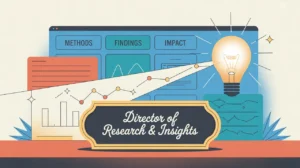What Does the Chief Data Officer Role Involve?
A chief data officer (CDO) is responsible for setting and leading an organization’s overall data strategy to ensure that data is collected, governed, analyzed, and leveraged as a strategic asset. This involves overseeing data infrastructure, governance frameworks, analytics, and the ethical use of data across the organization. The CDO ensures that data informs decision making, drives operational efficiency, supports innovation, and strengthens accountability. They work closely with executive leadership to align data initiatives with strategic priorities and to build a culture of data-driven practice. The role typically sits on the executive leadership team and spans strategy, technology, and operations. In both nonprofits and social enterprises, the CDO plays a critical role in enabling evidence-based decision making, improving impact measurement, and ensuring responsible data stewardship.
At What Level does this Role Operate?
Executive Level: This role operates at the highest level of organizational leadership, typically reporting to the CEO, COO, or president and serving as part of the executive team. The CDO oversees data teams, systems, and policies across multiple departments, providing strategic leadership on how data is collected, shared, analyzed, and applied.
Relative Employability: Executive data leadership roles are increasingly in demand across nonprofits, social enterprises, governments, and corporations as organizations recognize the strategic importance of data. Individuals with a combination of technical expertise, strategic vision, and leadership experience are particularly well positioned for these roles.
Relative Pay Scale: Within nonprofits and social enterprises, chief data officer roles sit in the highest pay bands for leadership positions. Compensation reflects the strategic significance of data for organizational effectiveness, innovation, and accountability.
What are the Key Responsibilities and Activities?
- Set and lead the organization’s data strategy and vision in alignment with strategic goals
- Oversee data infrastructure, governance, analytics, and ethical data use
- Develop policies and frameworks for data quality, privacy, and security
- Lead efforts to integrate data systems across departments to enable collaboration and efficiency
- Supervise data teams and build organizational capacity for analytics and evidence-based decision making
- Ensure data is used effectively for impact measurement, operational improvement, and innovation
- Advise leadership and the board on data trends, risks, and opportunities
- Foster a culture of responsible, data-informed decision making across the organization
What Core Competencies and Qualifications are Needed?
Required Qualifications and Experience
The following reflect common qualifications and experience expected for this role, while recognizing that pathways may vary by context, organization, and region.
- Relevant academic background in data science, statistics, computer science, information systems, or a related field, or equivalent professional experience
- Extensive leadership experience in data strategy, analytics, or information management
- Deep understanding of data governance, privacy regulations, and ethical data practices
- Proven ability to lead teams and advise senior leadership on data-related strategy
- Experience integrating data systems and leveraging data for organizational decision making
Key Competencies
- Strategic leadership in data and analytics
- Strong technical expertise in data management, architecture, and analysis
- Deep understanding of data ethics, privacy, and governance
- Ability to communicate complex data concepts to non-technical stakeholders
- Executive presence and strategic advisory skills
- Capacity to build organizational data cultures and cross-functional alignment
How are AI and Automation Shaping this Role?
An AI-native chief data officer will look to AI and automation to enhance data collection, improve analysis, and scale insights across the organization. They can use AI tools to identify trends in real time, develop predictive models, and automate data cleaning and integration tasks. Automation can support governance enforcement, compliance monitoring, and dashboard generation, allowing the CDO to focus on strategic leadership, innovation, and ethical oversight. By integrating AI effectively, the CDO can transform data into a powerful driver of organizational strategy and impact.
What Career Pathways and Transferable Skills are Associated with this Role?
Chief data officer roles represent senior leadership positions that bridge strategy, technology, and operations. From this role, professionals may advance to CEO, COO, or advisory positions, leveraging their strategic vision, data expertise, and organizational leadership skills. The combination of technical mastery, governance knowledge, and strategic influence developed in this role is transferable across sectors including nonprofits, social enterprises, government, and the private sector.







